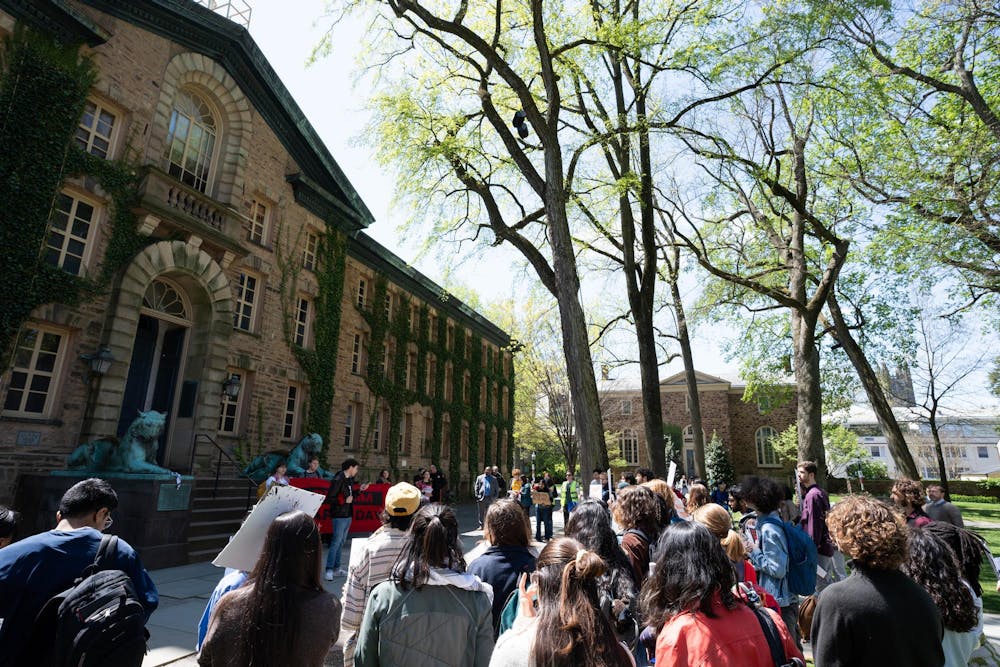This past Monday, April 22, was Earth Day. Since the very first Earth Day in 1970, students have used this day to celebrate the environment and demand action from powerful institutions on the climate crisis. The day has brought attention to environmental issues on college campuses, including at Princeton, from its inception. We, as Sunrise Princeton co-coordinators, celebrate how Earth Day has been a unifying force for the mainstream environmental movement. But we’re not satisfied with how Earth Day demonstrations have been co-opted by greenwashing campaigns and have kept the climate movement siloed from other liberatory struggles. That’s why Sunrise Princeton partnered with a coalition of organizers to cast off old frameworks this Earth Day and to demand that Princeton lead both in stopping actions that contribute to the climate crisis and in building climate justice in its community.
At Princeton, a broad conception of climate justice first includes finishing the job on divestment and dissociation — divesting the roughly $700 million of its endowment the University still holds in privately-owned fossil fuel companies and cutting research ties with greenwashing companies like BP, which currently fully funds the Carbon Mitigation Initiative at Princeton.
But true justice requires more than these actions. Princeton must not only withdraw its support from injustices, but also positively re-invest in sustainable and community-informed initiatives. In coalition and conversation with Young Democratic Socialists of America, Re:Wild Princeton, New Jersey Earth Defense, Students for Justice in Palestine, Princeton Israeli Apartheid Divest, Alliance for Jewish Progressives, and Students for Prison Education, Abolition, and Reform, we wrote demands for our Earth Day action, and they outlined a vision of a university for climate justice.
One way for the University to start building this vision close to home is by reinvesting in the municipality, including supporting social housing for our community members and workers. As a nonprofit institution, Princeton doesn’t have to pay taxes. But it can — and has — devoted money toward attenuating the rising cost of living in town that has for decades displaced low-income residents and residents of color further and further from town.
The University should put more effort into making Princeton an affordable town for all by fostering green social housing for our workers and our community’s low-income residents. This process can begin by expanding University rental housing stock for staff and bringing together community leaders to brainstorm ways to build climate-friendly social housing on the University-owned Butler Tract property. Bolstering local efforts to increase sustainable and affordable housing connects housing justice with climate justice, making it easier for workers and community members to live closer to the center of the municipality, which could decrease car reliance and lower emissions. In the short term, Princeton can also devote more assistance to local renters, whose housing is much more precarious.
Princeton must also keep its workers safe in our changing climate. Climate disasters hit our outdoor workers hardest, and the University isn’t keeping them safe. For instance, as smoke from Canadian wildfires rolled over campus this past summer, workers continued to carry out construction through the smoke without adequate safety measures or protective equipment. Princeton’s lack of strong adaptation infrastructure jeopardized the safety of construction contractors and Facilities workers alike. To better protect our workers, Princeton should outline clear policies in the face of new and intensifying climate disasters. In the case of wildfire smoke, these policies could include providing masks and other protective equipment and adjusting work schedules for hired outdoor workers — and encouraging contracting construction companies to do the same. We must be more prepared to meet the new reality of increased climate disasters in a way that prioritizes job safety for our outdoor workers.
We also know that climate justice is intertwined with other types of justice and that movements are stronger together. In spring of 2022, Divest Princeton won the battle for Princeton to disclose its total investments in fossil fuel companies. However, investment transparency and endowment justice extend beyond fossil fuel companies. We also call for Princeton to adopt a broader interpretation of divestment and dissociation that includes weapons manufacturers and companies that sustain Israeli apartheid and the military campaign in Gaza. Princeton cannot claim to be in the service of humanity if it profits from an ongoing campaign of mass killing, and it cannot claim to be a leader in sustainability if it invested in a campaign that poisons air, water, and soil, destroying agriculture and ecosystems and rendering the Palestinian landscape unlivable now and in the long term. Princeton must disclose its investments in, and then divest and dissociate from, these companies.
As we end the era of fossil fuels on campus, we must also begin an era of community support and climate solutions, on campus and beyond. These steps require a sincere and lasting shift in the relationship between the University, its workers, and its surrounding community — and to inspire other institutions to follow. Princeton has the power to be a model of environmental justice. Join Sunrise Princeton and sign our demands to tell them to live up to that promise.
Eleanor Clemans-Cope and Alex Norbrook are the co-coordinators of Sunrise Princeton, a group of students fighting for climate justice. Eleanor is a sophomore economics major and head Opinion editor at the ‘Prince.’ Alex is a sophomore history major and a columnist for the ‘Prince.’ Eleanor can be reached at eleanor.cc[at]princeton.edu and Alex can be reached at alexnorbrook[at]princeton.edu.









